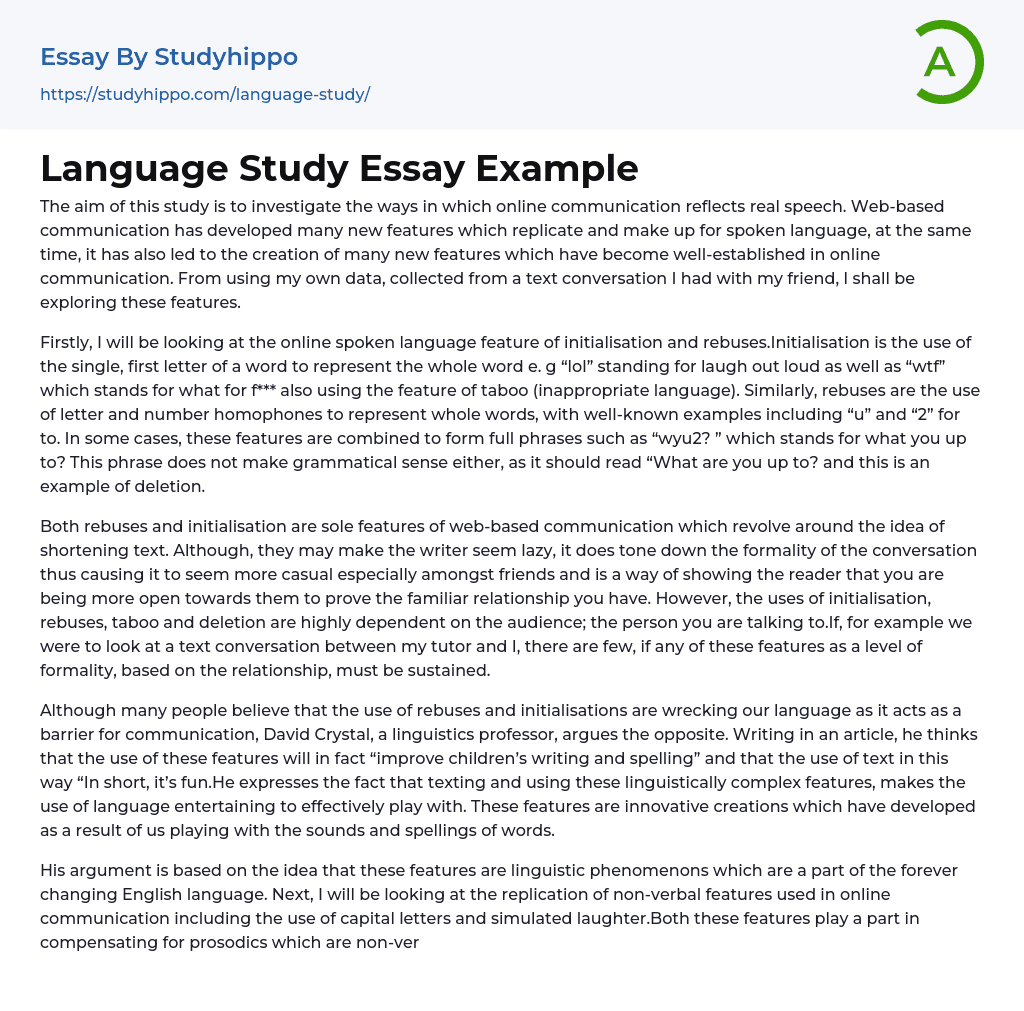I will be exploring the features of online spoken language, specifically initialisation and rebuses, using my own data collected from a text conversation with my friend. Initialisation involves using the single first letter of a word to represent the whole word, such as "lol" for laugh out loud and "wtf" for what for f***. This feature often includes taboo language. Rebuses, on the other hand, use letter and number homophones to represent whole words. Common examples include "u" for you and "2" for to. Sometimes these features are combined to form phrases like "wyu2?" for what you up to? These phrases may not be grammatically correct and demonstrate deletion.
Both rebuses and initialisation are common elements in web-based communication that involve abbreviating text. While some may view these abbreviations as a sign of laziness, they actually serve to make conversations more ca
...sual, particularly among friends. They also indicate a level of openness and familiarity with the reader. However, the use of initialisations, rebuses, taboo language, and deletion depends largely on the audience. For instance, when my tutor and I have a text conversation, we rarely use these features as a certain level of formality is expected based on our relationship. Despite the belief that rebuses and initialisations hinder communication and degrade language, linguistics professor David Crystal argues the contrary.
In his article, the writer believes that utilizing these features will enhance the writing and spelling abilities of children, making language use more enjoyable. By incorporating text in this manner, it becomes an engaging way to play with language. These innovative features have emerged as a result of experimenting with word sounds and spellings. The writer argues tha
these features are linguistic phenomena that reflect the ever-evolving English language.
Moving forward, I will examine the imitation of non-verbal aspects utilized in online communication, such as capital letters and simulated laughter. Both of these features compensate for the absence of non-verbal signals, known as prosodics, that contribute to the meaning of spoken words. Examples include yawns, grunts, and giggling, which cannot be conveyed through online communication. However, simulated laughter in the form of "hahahahahaha" and "kekekekeke" acts as onomatopoeia to replicate the sound of laughter, allowing the reader to understand the writer's emotions.In addition, the writer utilizes capital letters to convey a sense of both shouting and anger, enhancing the impact of their expression. By employing capitals, the words become bold and prominent, truly emphasizing the intended message in a manner similar to how shouting amplifies communication.
Although online communication lacks prosodics, the replication of non-verbal features through emoticons achieves the same effect and purpose. Emoticons, a recent addition to online communication, consist of smileys that convey the writer's desired emotion. From my data, it is clear that emoticons are commonly used in web-based communication and they enhance the readability and enjoyment of conversations. Similar to rebuses and initialisation, the presence of emoticons creates a friendlier atmosphere with the recipient. However, the primary reason for using emoticons is to make up for the absence of paralinguistics when not communicating face to face.
Paralinguistics, such as hand gestures and facial expressions, hold great significance in spoken language, reinforcing or contradicting verbal communication. In online interactions where paralinguistics are absent, emoticons are employed to mimic facial expressions and emphasize the writer's emotions. Emoticons, though absent in spoken language,
play a crucial role in compensating for the nonverbal cues evident in face-to-face conversations. However, there exists dissent regarding the use and importance of emoticons in web-based communication. John Humphreys, a journalist from the Daily Mail, derides emoticons as "absurd little faces" that inundate text messages. He views emoticons as part of a distinct language that is excessively used and has become an unfortunate habit among young people. Humphreys harshly criticizes emoticons, displaying a lack of comprehension regarding their purpose and dismissively labeling them as foolish. In his article, he also expresses concerns that emoticons will come to dominate written language, reducing it to a collection of absurd emoticons and ever-evolving abbreviations.
In summary, I have come to understand that web-based communication possesses elements that mimic the paralinguistics and prosodics found in spoken language. These elements encompass emoticons, simulated laughter, and the use of capital letters. Although they differ from actual speech, they still elicit similar effects. Additionally, online communication also incorporates specific features like initialisation and rebuses that help convey the tone of the conversation.
- Second Language essays
- English Language essays
- Semiotics essays
- Dialect essays
- Sign Language essays
- Spanish Language essays
- French Language essays
- Language Education essays
- Second Language Acquisition essays
- Teaching English As A Foreign Language essays
- Verb essays
- Gesture essays
- Christina Rossetti essays
- Emily Dickinson essays
- Ernest Hemingway essays
- Percy Bysshe Shelley essays
- Robert Browning essays
- Robert Louis Stevenson essays
- Seamus Heaney essays
- Carol ann duffy essays
- Anne Bradstreet essays
- Elizabeth Bishop essays
- Peter Skrzynecki essays
- Poets essays
- Robert Frost essays
- Aldous Huxley essays
- Anton Chekhov essays
- Charles Dickens essays
- Edgar Allan Poe essays
- F. Scott Fitzgerald essays
- Harper Lee essays
- Homer essays
- Jane Austen essays
- John Steinbeck essays
- Kurt Vonnegut essays
- Mark Twain essays
- Mary Shelley essays
- Nathaniel Hawthorne essays
- Sophocles essays
- Stephen King essays
- William Shakespeare essays
- Zora Neale Hurston essays
- Amy tan essays
- Virginia woolf essays
- Alice Walker essays
- Chinua Achebe essays
- Sherman Alexie essays
- George Orwell essays
- Sylvia Plath essays
- T. S. Eliot essays




